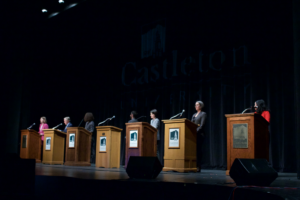The race for Welch’s seat in Congress comes to CU

For the first time since 2006, the opportunity for a new candidate to represent Vermont in Congress’ House of Representatives has occurred.
Vermont’s high incumbency re-election rates suggest that whoever is elected into the lower house of government this coming election is likely to remain.
So, who is up for the task?
The Candidate Forum held on April 25 in Casella Theater was an opportunity for both students and members of the public to understand each candidates’ platform, political standing and commitment to an array of hot-topic issues.
The evening proved interesting with the seven candidates positioned along the political spectrum, giving the Vermont community plenty of information to consider. From Republican-orientated Ericka Redic, to left-wing advocate Sianay Chase Clifford, there was never a dull moment.
Arguably, most anticipated in the upcoming election is who Vermonters will choose to replace moderate democrat and current representative, Peter Welch. Since James “Jim” Jeffords shifted from the Republican Party to an Independent that caucused with the Democrats in 2001, Vermont has consistently elected democratic representatives.
The politically diverse set of candidates who spoke at the forum may challenge this consistency, altering the national identity of the state.
The topics discussed centred on issues plaguing the Vermont community as well as broader America, including student loan debt, the climate crisis, the BIPOC community and mental health on college campuses.
However, the underlying question seemed to revolve around who could represent the interests of Vermonters — undoubtedly a complex and demanding task.
Candidate Liam Madden’s radical restructuring of the economy and ‘rebirthing democracy’ strategy was an urgent and consistent message throughout the forum, founded upon the notion that, “our sustainability crisis and the fact that we have an economy that is premised on never ending growth, which is itself driven by a treadmill of never ending debt.”
Madden proposed a rejection of Alexandria Ocasio-Cortez’s Green New Deal and replaced it with a Manhattan Project-type mindset to the climate crisis that involves radical, innovative, systemic changes.
“Something more on the scale of rebirthing democracy, not just the New Deal,” Madden said.
Liberian-American Chase Clifford, only 27-years-old, presented unique and bold insights from a young, fresh lens into the demographic reality of Capital Hill.
“We are facing collective challenges and in order to meet them, we need incredible structural changes and politicians who are bold enough to tackle them. We live in a world where politicians, unfortunately many of them, will never live with the impact of their decisions,” Clifford said at the forum.
Most interestingly, the power of the president and the federal government was contended.
This power was discussed in relation to issues of national interest such as student loan debt and climate change. The varying degrees of confidence each candidate expressed for the executive branch was both reassuring and concerning.
“The government does not have the ability to protect you from everything. It does not have the ability to save you from everything,” Redic said. “No, Joe Biden does not have the authority [to cancel student loan debt]. We have a separation of powers, executive, legislative, and judicial branches. We do not have a King.”
Redic’s statement came under contention as Senator Kesha Ram Hinsdale explained that, “absolutely yes, the President does have the authority to cancel student loan debt.”
Ram Hinsdale has a strong connection to Castleton University’s NAACP — as she was present at the organisation’s founding — and her optimism towards the federal government’s ability to stop the growing tendency to treat “college like an industry and a business” was undoubtedly a sign of relief to the university community.
Student loan debt, the climate crisis, BIPOC policy, and the mental health of college students are topics rooted in controversy and disagreement, however spotlighting these issues allowed the audience to delve into the grit of each candidate’s platform.
The democratic process is in action and the coming election will undoubtedly reveal the current political priorities of Vermont communities.
“This is a critical time for our country and the world. The next several years we are either going to make progress or we are going to have disasters continuing to occur around the world,” candidate Louis Myers said.







